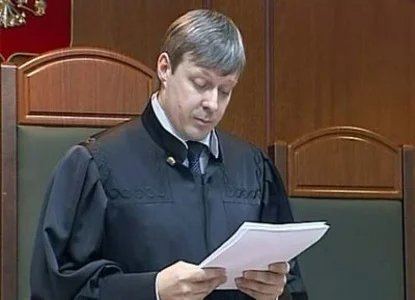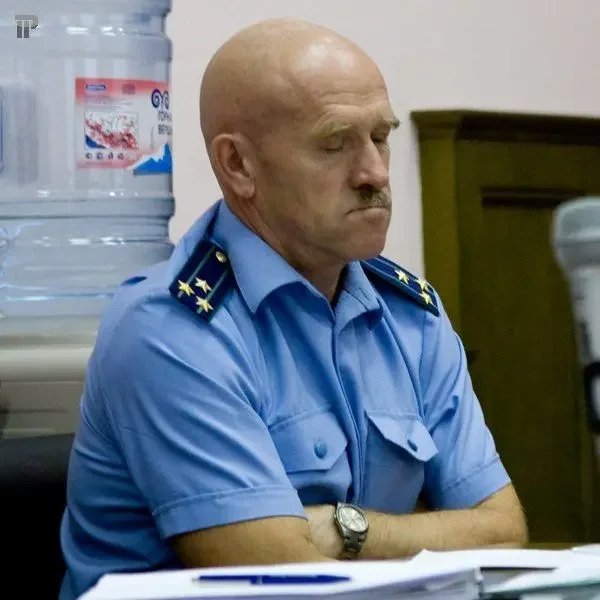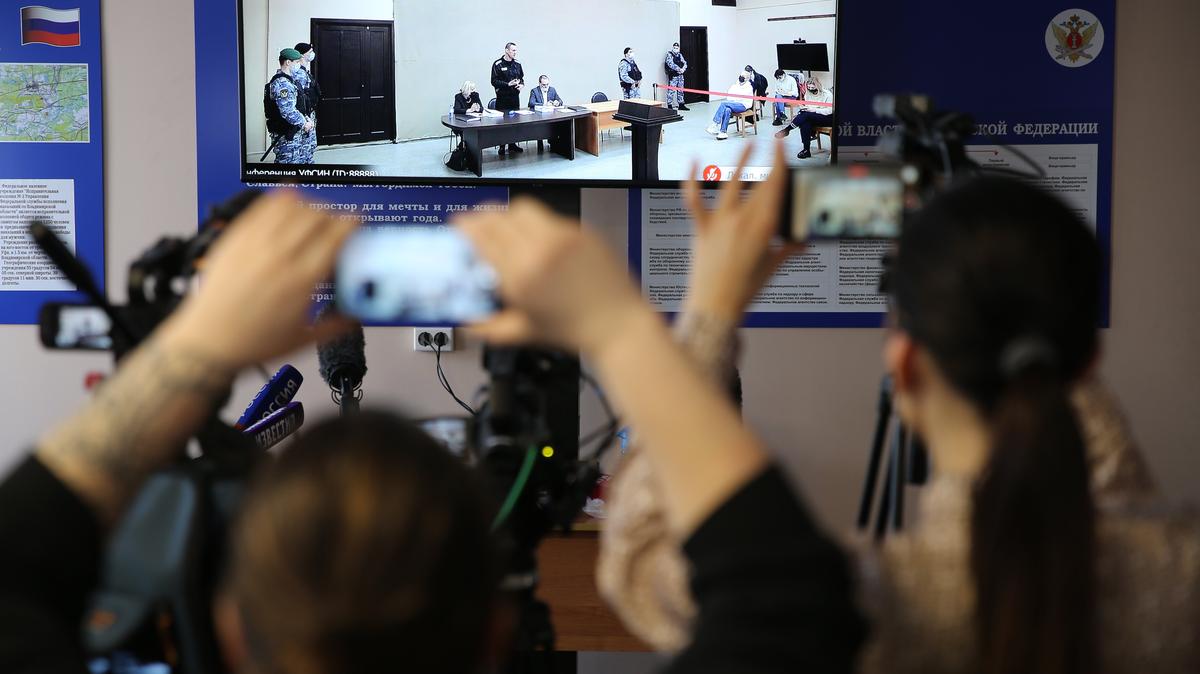Though technically independent, Russia’s judiciary was quick to understand what was expected of it once the country was at war. Since last March, judges have been imposing the harshest possible sentences on those daring to speak out against the invasion of Ukraine. Today, anyone unfortunate enough to find themselves in the glass “aquarium” of a Russian courtroom must prepare for the worst. Novaya Gazeta Europe looks at the careers of three members of Russia’s legal establishment to trace the development of their radicalism.
Name: Sergey Podoprigorov
Position: Judge at Moscow’s City Court
First appointed to Moscow’s Tverskoy District Court in 2003, Podoprigorov became notorious in 2008 first for authorising the arrest of tax auditor Sergey Magnitsky on charges of “collusion” after he exposed high-level government corruption and then for turning down Magnitsky’s repeated pleas for medical care. Less than a year after Podoprigorov ruled that there had been no suggestion of “inhuman or degrading treatment”, Magnitsky died in pre-trial detention from what human rights activists called the “wilfully cruel treatment” to which he was subjected.
The Magnitsky case, which was a watershed moment for Russia’s international reputation, led the United States Congress to pass the Magnitsky Act in 2012, which sanctioned officials — including Podoprigorov — involved in the case. In April, Russian investigative outlet Verstka reported that Podoprigorov hired an international law firm to challenge his inclusion on the Magnitsky list. He has always stressed that he was selected “by chance” to judge the case as he had been “one of the judges on duty that day”.

Sergey Podoprigorov. Photo by pravo.ru
Podoprigorov was again in the news following the mass detention of people peacefully protesting the re-election of Vladimir Putin on Moscow’s Bolotnaya Square in 2012, when he sentenced several demonstrators to sizeable jail terms for what he termed “organising mass riots”.
Last year Podoprigorov served on a panel of judges in the high-profile trial of opposition politician Vladimir Kara-Murza, who was tried behind closed doors for a speech he gave in the US denouncing the Russian bombing of civilians in Ukraine. Kara-Murza’s role lobbying the Obama administration to pass the Magnitsky Act and to include Podoprigorov on the list of sanctioned individuals presented a clear conflict of interest for the judge.
Kara-Murza’s lawyer Vadim Prokhorov asked Podoprigorov to recuse himself over what he termed the judge’s “direct and personal interest in the defendant’s arrest”. The fact that he had not done so meant he had violated Russian law, Prokhorov subsequently told Novaya Gazeta Europe.
The trial resulted in a 25-year prison sentence that managed to shock even the most hardened observers of Russia’s criminal justice system. The trial went ahead despite several reports that Kara-Murza’s severe nerve disorder, which he developed after surviving two poisoning attempts, was worsening in the absence of proper medical care.
Last month, Podoprigorov sentenced Daniel Kholodny, the former technical director of jailed opposition politician Alexey Navalny’s YouTube channel, to eight years in prison for his involvement in what he called Navalny’s “extremist community”.
Podoprigorov’s legal challenge to have his name removed from the Magnitsky list was unsuccessful. He also remains under UK, EU, and Ukrainian sanctions.
Name: Boris Loktionov
Position: Prosecutor at the Prosecutor General’s office
Also under British sanctions is Boris Loktionov, who rose to fame in 2011 when he prosecuted radical nationalists Nikita Tikhonov and Yevgenia Khasis for the murder of human rights lawyer Stanislav Markelov and Novaya Gazeta journalist Anastasia Baburova. Although it was two other prosecutors who proved that the defendants’ alibi was fabricated, Loktionov gained media attention for the uncompromising stance which he would go on to exhibit in subsequent cases throughout the decade. “Today there is evil sitting behind that glass,” he told the jury, “and it must be punished.”
He entrenched his reputation as a hard-liner in two other high-profile cases in 2015 and 2018. After Sergei Polonsky was extradited from Cambodia on embezzlement charges, Loktionov served as the prosecutor in the case. He was so severe that Polonsky requested, unsuccessfully, that he be removed from the case due to “aggressiveness”. Three years later, Loktionov prosecuted Alexander Drymanov, former head of the Moscow branch of the Russian Investigative committee, who was arrested for accepting a $1 million bribe from a crime boss. Drymanov was sentenced with 12 years in prison, but Loktionov reminded the jury that “under the old code, execution [would have been the punishment] for this crime.”

Sergey Podoprigorov
Loktionov has become even more radical in recent years. When reporter Ivan Safronov was arrested in 2020 for disclosing state secrets, Loktionov pushed for a 24-year prison sentence — twice as long as the sentence proposed by his colleague, prosecutor Elvira Zotchik. The court ultimately handed the journalist a 22-year term, which human rights lawyer Pavel Chikov called a “savage, demonstratively cruel punishment,” adding that he knew of no previous treason cases that had resulted in such a long sentence.
Last year, Loktionov was assigned to the Kara-Murza case, where he conducted himself more ruthlessly than ever before, according to those permitted to attend the closed-door trial. At one point, according to Prokhorov, Loktionov produced a photograph of Kara-Murza with the late opposition politician Boris Nemtsov, in which Nemtsov’s hand is in the air; Loktionov described the gesture as a “Nazi salute”.
“Loktionov’s logic is clear,” Prokhorov says: “only Nazis can oppose the policy of our beloved Putin!” Witnesses also said that Loktionov called Kara-Murza “an enemy [who] must be punished”, requesting the journalist be given a 25 year sentence, a request the court dutifully met.
Since July, Loktionov has been under British sanctions.
Name: Olesya Mendeleeva
Position: Judge at Moscow District Court
Although Moscow judge Olesya Mendeleeva is now notorious for handing out long sentences, she hasn’t always been a radical. In a 2015 embezzlement case, Mendeleeva sentenced Dmitry Bezdelov, the former head of Russia’s infrastructure agency, to nine years in prison and fined him 490 million rubles (€7.3 million), but stopped short of invoking an article of Russia’s criminal code penalising racketeering and gang activity. The article, a favourite of the security forces, is often used to justify even harsher sentences, and Mendeleeva’s failure to include it was seen as lenient. As punishment, she was demoted and assigned only minor cases for several years.
It appears she learned her lesson. Once again trusted with more high-profile cases, Mendeleevahas invoked the article in the majority of her verdicts since then, with her harsh sentences earning her a reputation for severity.
In 2019, she ruled on the case of Yevgeny Kovalenko, a protester who threw a rubbish bin at a law enforcement officer when he saw “peaceful unarmed people [being] beaten” by the police. During the trial, Mendeleeva refused to consider video evidence of police brutality provided by Kovalenko’s lawyers and sentenced Kovalenko to three and a half years in prison. In 2022, she sentenced businessmen Ziyavudin and Magomed Magomedov to jail terms of 19 years and 18 years respectively after finding them guilty of racketeering and embezzlement at a trial she conducted behind closed doors at the FSB’s request.
Mendeleeva’s rulings since the outbreak of the war have been even more severe. Last year she was assigned the case of Alexey Gorinov, a 61-year-old local politician in Moscow who suggested cancelling a children’s drawing competition on the grounds that it might look like a “feast during the plague” in light of children dying in Ukraine. Mendeleeva sentenced Gorinov to seven years in a penal colony for the comment, becoming the first judge in Russia to find a defendant guilty under the newly introduced charge of disseminating “deliberately false information” about the Russian military. Gorinov had deliberately committed a crime, Mendeleeva wrote in her verdict, that had created “аeelings of anxiety and discontent” among his fellow citizens. Gorinov, who has tuberculosis, was also reportedly denied proper medical care while in custody.
This summer, Mendeleeva was placed under Ukrainian sanctions for “deliberately violating the rights and freedoms of citizens” in her rulings.
Glimmers of hope?
Against this grim backdrop, two Russian judges stand out for their bravery in defying the regime. Maria Kozyakova, a judge in the central Russian city of Voronezh, refused to fine a local resident for holding a solo protest with a “Stop the war” sign. Although the police claimed he had “committed public actions aimed at discrediting the Russian Armed Forces”, Kozyakova ruled that the defendant had done nothing wrong as, according to the state itself, Russia’s military presence in Ukraine was part of a “special military operation,” not a “war”.
Irina Tsybulskaya, a judge in the city of Yekaterinburg in the Urals, also refused to play ball in a when Alexander Neustroev was brought before her on charges of hooliganism. Nustroev had insulted a schoolboy for wearing a hat emblazoned with the letter “Z” — a symbol of support for Russia’s war in Ukraine. Tsybulskaya levied a fine of 7,000 rubles (€67). Following her ruling, the chairman of the State Duma Committee on Information Policy, Alexander Khinshtein, publicly excoriated Tsybulskaya, demanding the court’s decision be appealed and likening her behaviour to “spitting in the face” of Russian soldiers fighting in Ukraine.
Join us in rebuilding Novaya Gazeta Europe
The Russian government has banned independent media. We were forced to leave our country in order to keep doing our job, telling our readers about what is going on Russia, Ukraine and Europe.
We will continue fighting against warfare and dictatorship. We believe that freedom of speech is the most efficient antidote against tyranny. Support us financially to help us fight for peace and freedom.
By clicking the Support button, you agree to the processing of your personal data.
To cancel a regular donation, please write to [email protected]

